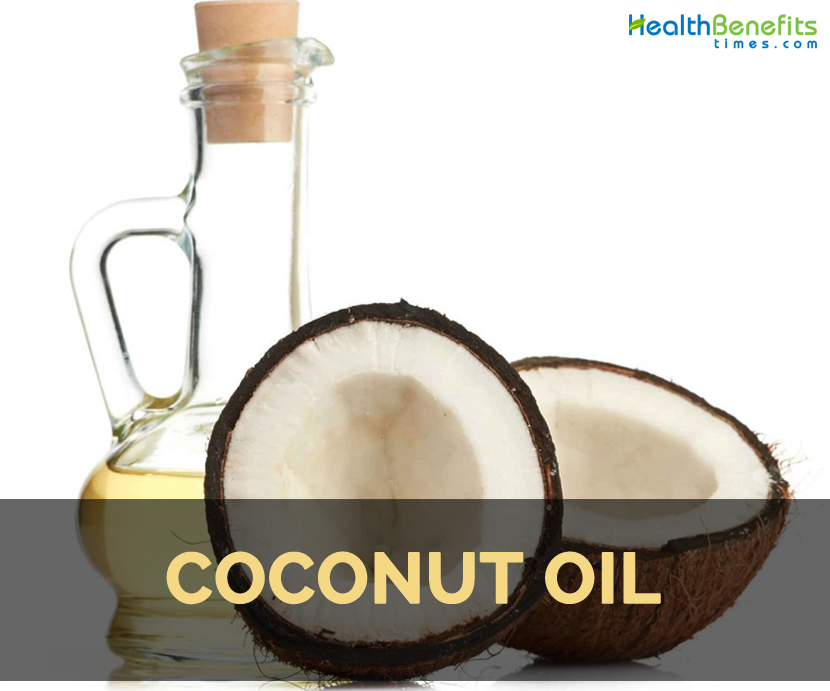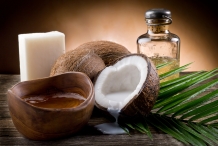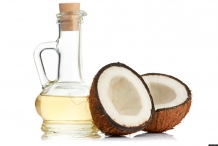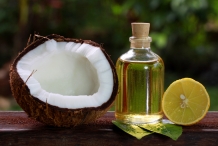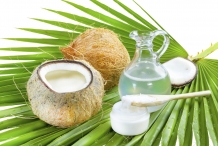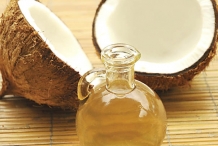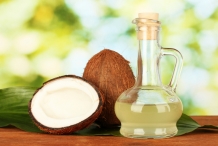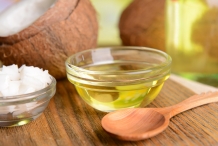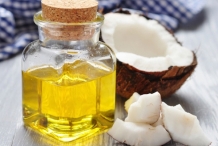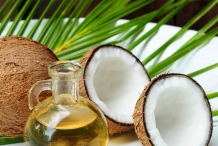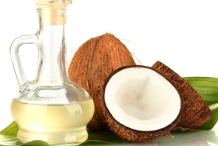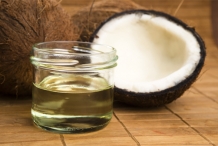| Coconut oil facts and benefits Quick Facts |
| Name: |
Coconut oil facts and benefits |
| Origin |
Coconut was firstly observed in 5th century A.D. from Costas which is an Egyptian traveler. The scholars believed to be a coconut which he wrote about finding an Indian nut. In 9th century, the coconuts were used to make fibers in the marker in China. |
| Colors |
White |
| Calories |
121 Kcal./cup |
| Major nutrients |
Total Fat (38.49%)
Iron (0.13%)
Vitamin K (0.08%)
Vitamin E (0.07%)
|
| Health benefits |
Healthy skin, Hair health, Heart problems, Assist to lose weight, Enhance immunity |
This oil is extracted from the coconut. The oil has waxy and soft consistency and is malleable. It has components such as capric acid, lauric acid, antimicrobial lipids, caprylic acid and saturated fat. Coconut oil is used as an ingredient in vegan beauty products and all natural beauty products such as lip balms, lotions, shaving creams and makeup remover. It has high content of saturated fat and medium chain fatty acids that helps to bypass and metabolize the normal fat. Coconut oil has fatty acids maintains coagulation factors and prevents the chances of heart ailments by lowering the level of triglycerides and cholesterol. It possesses antioxidants such as pro Vitamin A, Vitamin E, phytosterols and polyphenols. It is used for cooking purposes due to the high burning point. This oil becomes solid at room temperature and usually used for baking and to add nutty vanilla like flavor.
History
Coconut was firstly observed in 5th century A.D. from Costas which is an Egyptian traveler. The scholars believed to be a coconut which he wrote about finding an Indian nut. In 9th century, the coconuts were used to make fibers in the marker in China. In year 1280, Marco Polo referred coconuts as nux indica. The leaves of coconut is used to make baskets, meat for consumption, milk and water to drink, shells to use as bowls, utensils and musical instruments. Before the mass production of oils by the companies and factories, people extracted oil on its own.
Nutritional value
One tablespoon serving size of Coconut oil provides 121 calories and 13.47 grams of total lipid fat while saturated fat has majority role. It does not have protein, cholesterol and carbohydrates. Coconut oil also has iron, vitamin K and vitamin E and high content of phenolic compounds that are natural antioxidants. Coconut oil (unrefined) has high content of phenolics. Antioxidants help to prevent body from damage caused due to free radicals and toxins.
Health Benefits of Coconut oil
Coconut oil is used for hair care, skin care, treat yeast infections, weight loss, enhance immunity and improve digestion. This oil is used to prevent heart disease, Alzheimer’s disease, blood pressure and buildup of cholesterol. It is used to treat inflammation and kidney diseases. Coconut oil has medium chain fatty acids. Some health benefits are discussed below:
- Oral health
Coconut oil has the ability to counteract bacterial that are the cause for tooth decay. It acts as antibiotic that is used in dental care products. It has antibacterial properties. It inhibits the growth of Streptococcus bacteria and Streptococcus mutans which is an acid producing bacterium that causes tooth decay. (1)
- Growth of fungus
Coconut oil effectively controls the growth of fungus called Candida albicans in mice as shown by the study. The blood stream could be infected due to the high presence of C.albicans in gastrointestinal tract. It lowers the infections caused due to C.albicans. C.albicans could cause systemic infections that could lead to invasive candidiasis that causes infection of blood. (2)
- High blood pressure
Coconut oil has positive effects on health such as better brain function, fat loss and various benefits. The intake of coconut oil as well as exercise training helps to restore baroreflex sensitivity and lowers oxidative stress that results in blood pressure. It lowers weight gain in rats. The blood pressure is lowered by the improvement of lowered baroreflex sensitivity and lower oxidative stress in heart, serum and aorta. (3)
- Healthy skin
Coconut oil is used as massage oil and is used as a moisturizer for all types of skin including the dry skin. It does not have adverse side effects like mineral oil. This oil prevents flaking and dryness of skin. It slows down the appearance of wrinkles as well as sagging of skin that are the common signs of aging. It is used to prevent degenerative diseases such as premature aging due to the presence of antioxidant properties. It treats the skin problems such as dermatitis, psoriasis, skin infections and eczema. Dermatologists recommend this guide if you want to try out coconut oil for your skin care.
- Hair health
Coconut oil is used for the growth of hair and provides shine to the hair. It lowers the protein loss that could result to unhealthy qualities of hair and unattractiveness. It could be applied as a hair oil and used for dandruff relief creams and conditioners. It is topically applied for hair care. It provides nutrients and proteins to the hair that helps to nourish and heal damaged hair. It treats the hair damage caused due to hygral fatigue. Massage head with coconut oil to eliminate dandruff and dry scalp condition. It also eliminates hair from lice as well as its eggs.
- Heart problems
Coconut oil has high content of saturated fats that is beneficial for the maintenance for the healthy heart. It has 50% of lauric acid that prevents the chances of heart problems such as high blood pressure and high cholesterol levels. This oil doesnot raise LDL level and lowers the incidence of damage and injury to arteries and prevents the chances of atherosclerosis. The study shows that coconut oil helps to maintain healthy lipid profiles in premenopausal women. (4) (5)
- Assist to lose weight
Coconut oil is helpful for losing weight due to the presence of short and medium chain fatty acids. It lowers abdominal obesity in women. It supports the functions of endocrine and thyroid system. Moreover, it increase metabolism of the body by eliminating stress on pancreas and burning more energy.
- Enhance immunity
Coconut oil helps to strengthen immune system as it possess lauric acid, antimicrobial lipids, caprylic acid and capric acid that possess antibacterial, antifungal and antiviral properties. It helps to deal with bacteria and virus that are the cause for diseases such as influenza, herpes, cytomegalovirus as well as HIV. It helps to counteract bacteria such as helicobater pylori and listeria monocytogenes as well as giardia lambia gardia which are harmful protozoa.
- Supports digestive health
Coconut oil supports the internal functions if used as cooking oil. It enhances digestive health and prevents digestion and stomach related problems such as irritable bowel syndrome. Coconut oil has saturated fats that possess antimicrobial properties and deals with fungi, bacteria and parasites that are associated with indigestion. It prevents the nutrient absorption such as minerals, vitamins and amino acids.
- Dental health
Calcium is vital for the teeth health. Coconut oil facilitates calcium absorption and assist in the development of strong teeth. The research shwos that coconut oil is very helpful in lowering the formation of plaque and plaque induced gingivitis. (6)
- Relieve inflammation
Candida is a disease that is caused due to the high growth of yeast named Candida Albicans in stomach. This oil is used to provide relief from inflammation that is caused due to candida both internally and externally. It has high retaining capacity of moisture that prevents the skin from peeling and cracking.
- Prevent infections
The application of coconut oil to the infected areas prevents the infected body parts from air, external dust, bacteria, fungi and viruses. It is helpful for bruises as it speeds up its healing process.
- Treatment for cancer and HIV
Coconut oil is vital for lowering viral susceptibility for cancer and HIV patients. The research shows that coconut oil is able to lower the virus of HIV patients. This oil helps to eliminate bacteria that are the cause for throat infections, ulcers, pneumonia, urinary tract infections and gonorrhea. It helps to eliminate yeast and fungi that are the cause for athlete’s foot, ringworm, diaper rash and thrush. (7) (8)
https://www.youtube.com/watch?v=FGY2uzJInFE
Traditional uses
- It supports weight loss, boost memory as well as immune system.
- It is used to treat Alzheimer’s disease.
- It helps to treat skin problems such as psoriasis, acne, eczema and rosacea.
- It enhances metabolism and increases body temperature.
- It is used to eliminate lice, dandruff and strengthen hair.
- It decreases the chances of heart ailments.
- It interacts fungal infections both internally as well as externally.
- It prevents free radical damage and also prevents the chances of premature aging.
- It assist digestion.
- It rejuvenates skin and prevents wrinkles.
- It is used as a hair conditioner and helps to treat damaged hair.
- It is used to treat ringworm, Athletes foot, rashes and chicken pox.
- It is a cure for earaches, bee stings, bruises, cracked heels, insect repellant, diaper rash and cradle cap.
- It could be used in makeup remover, shaving cream, eye cream, deodorant and hair conditioner.
- It is used to treat chronic fatigue, Chron’s disease, Alzheimer’s disease, energy, thyroid conditions and enhance immune system.
- Rub the mixture of coconut oil and eucalyptus oil to the chest that helps to open up airways and facilitate breathing. It helps to clear congestion and provides a good night sleep.
- Rub coconut oil on the stomach during and after pregnancy to lower stretch marks that occurs due to compromising of skin’s elasticity. It helps to eliminate discoloration, dark marks as well as redness. It hydrates the skin and assist in healing process.
- Coconut oil lowers chronic inflammation and enhance immune system.
- It is useful for dental cavities, food poisoning, ringworm, urinary tract infections, pneumonia, candida, ringworm, diaper rash and athlete’s foot.
- It is used as the treatment for flu, measles, hepatitis C and herpes.
- It is useful for hypertension patients.
- It provides relief from stress on enzyme systems and pancreas.
- It lowers the symptoms related to pancreatitis.
- It also provides relief from chronic fatigue syndrome and lowers epileptic seizures.
- It prevents bladder infections and kidney problems.
- It is used to moisturize and provide relief from dry and itchy skin and also used to remove makeup.
- For hair, it is used as a moisturizing treatment and deep conditioning.
- It enhance the absorption of vitamins and nutrients.
Precautions
- Allergic people should avoid it.
- The daily intake of coconut oil increases the level of bad cholesterol.
- It may cause hypertension or high blood pressure.
- It might clog the arteries and could cause stroke, heart attack and even death.
- It may be the cause for metabolic disorders.
- Allergic reactions such as breakouts, rashes, nausea, urticarial, itching, swelling, shortness of breath and vomiting might be experienced.
Culinary uses
- It is used for cooking and baking purposes as well as to add nutty and vanilla like flavor to the foods.
- It could be added to food, smoothies or supplements.
- It is used for both vegetarian and non-vegetarian recipes.
Other Facts
- Coconut oil has high smoking point.
- It becomes solid at room temperature.
- This oil does not have cholesterol in it.
Coconut oil facts
Coconut oil helps to soothe skin due to its healing properties. The oil is extracted from the flesh of mature coconuts.
| Name |
Coconut oil facts and benefits |
| Native |
Coconut was firstly observed in 5th century A.D. from Costas which is an Egyptian traveler. The scholars believed to be a coconut which he wrote about finding an Indian nut. |
| Common/English Name |
Aceite de Coco, Coconut Fatty Acid, Acide Gras de Noix de Coco, Coconut Palm, Coconut, Coco Palm, Cocotier, Cocos nucifera, Cold Pressed Coconut Oil, Huile de Coco, Fermented Coconut Oil, Huile de Noix de Coco Pressée à Froid, Huile Vierge de Noix de Coco, Huile de Noix de Coco, Noix de Coco, Narikela, Palmier, Virgin Coconut Oil |
| Name in Other Languages of Coconut oil |
Amharic: ko-‘o-ko-‘o-ne-te, ko-ka-se, Kokas, Kokonet;
Arabic: jadhirdah, Jooz al-hind;
Armenian: Hendkakan Enkoyz, Hentgagan Engouz, Hĕndkakan Ĕnkoyz;
Assamese: Narikol;
Basque: koko;
Bengali: Narakel, Narikel, Nariyal, Nirikel, Narakela (নারকেল), Narokel (নারকেল);
Bulgarian: Kokos (Кокос);
Burmese: ong, ung, Ungbin;
Catalan: Coco;
Chinese: Kěkě yēzi (可可椰子), Yēzi (椰子);
Croatian: Kokos, Kokosov orah;
Czech: Kokos, Kokosový ořech;
Danish: Kokosnød;
Dutch: Kokos, Kokosnoot, kokosnootpalm;
Esperanto: Kokoso;
Estonian: Kookospalm;
Finnish: Kookospalmu, Kookospähkinä;
French: Coco, Cocotier, Cocotier commun, Noix de coco;
German: Kokos, Kokosnusspalme, Kokosnuß, Kokospalme;
Gujarati: Nariel, Nariyel (નારિયેળ);
Hausa: Mosara;
Hawaiian: Niu;
Hebrew: Kokus, Qoqus;
Hindi: narel, Narial, Nariyal, Nariyal (नारियल), naarel (नारेल), naairayal (नािरयल);
Hungarian: Kókuszdió;
Icelandic: Kókoshneta;
Igbo: Aku oyinbo;
Indonesian: Kelapa, Nyiur;
Italian: Cocco;
Japanese: Kokoyashi (ココヤシ), Shokuyō (食用);
Kannada: Kobbari (ಕೊಬ್ಬರಿ), kŏbbari, Narikela, nārikeḷa (ನಾರಿಕೇಳ), Tengu (ತೆಂಗು), tĕṅgu (ತೆಂಗು);
Kashmiri: Noril (नोरिल);
Korean: ko-ko-su, ko-ko-ya-ja, Kokosu, Kokoyaja, ya-ja-na-mu yeol-mae, Yaja-namu yeolmae, Yaja-namu yolmae (야자나무 열매), kokosu (코코수), kokoyaja (코코야자);
Lao: Kok mak phao;
Lithuanian: Riešutinis kokosas;
Malay: Kelapa, Nyiur;
Malayalam: Coconut, Nalikeram, Thenga, Thengu (തെങ്ങ്);
Mandinka: Coco, Tubab sibo;
Marathi: Mad, Mar, māḍ, Naral, nāraḷ, Nāraḷa (नारळ), Māḍa (माड), Shriphal (श्रीफळ);
Oriya: Nadiya;
Pali: Nalikera (नालिकेर );
Persian: nārgīlah;
Polish: Palma kokosowa;
Portuguese: Coqueiro, coqueiro da Bahia;
Romanian: Cocotier, Nucă de cocos;
Russian: Kokos (Kokos), Kokosovyj oreḫ, Kokosovyj orjekh, Kokosovyy orekh (Кокосовый орех);
Sanskrit: kalpavriksha, Narikela, Uchchataru (उच्चतरु), Karakatoyah (करकतोय), Karakambhas (करकम्भस्), Kalpavriksha (कल्पवृक्ष), Kikih (किकि), Kaushikaphalah (कौशिकफल), Khanamudakah (खानमुदक), Trnamdrumah (तृणम्द्रुम), Trnamrajah (तृणम्राज), Trnamvrukshah (तृणम्वृक्ष), Trinetraphalah (त्रिनेत्रफल), Dirghapatrah (दीर्घपत्र), Dirgapadapah (दीर्घपादप), Durhah (दुर्ह), Narikera (नारिकेर);
Sinhalese: Pol, Polgaha;
Slovak: Kokosový orech;
Slovenian: Kokosa, Kokosova palma;
Spanish: Coco, Coco fruto, cocotero, Palma de Coco;
Swahili: Dafu, Nazi;
Swedish: Kokos, Kokosnöt, kokospalm;
Tagalog: buko, Niyog;
Tamil: Tengai, Tengu, teṅku, teṅkāy, Tengku (தெங்கு), Tēṅkāy (தேங்காய்), Tēṅku (தேங்கு);
Telugu: Kobbarikaya, kŏbbarikāy, Narikelamu, nārikeḷamu, Tenkaya, Kobbarikāya (కొబ్బరికాయ), Ṭeṅkāya (టెంకాయ), నారికే (Narikel), (నారికేళము) Nārikēḷamu, ṭĕṅkāya;
Thai: Maprao, Maphr̂āw (มะพร้าว);
Urdu: Nariyel (ناریل );
Vietnamese: Cot dua, Cốt dừa, Dua, Dừa;
Wolof: koko;
Yiddish: Kokosnus;
Yoruba: Agbon |
| Extracted from |
Coconut meat |
| Melting point |
76-78 Fahrenheit (24-25 degrees Celsius) |
| Color |
White |
| Scent |
Mild to fresh |
| Major Nutritions |
Total Fat (lipid) 13.47 g (38.49%)
Iron, Fe 0.01 mg (0.13%)
Vitamin K (phylloquinone) 0.1 µg (0.08%)
Vitamin E (alpha-tocopherol) 0.01 mg (0.07%) |
References:
http://lifedesignnutrition.com/wp-content/uploads/2014/02/The-Facts-About-Coconut-Oil-1.pdf
http://www.medicinenet.com/coconut_oil/supplements-vitamins.htm
http://coconutresearchcenter.org/
http://nutiva.com/coconut-info/
http://www.stylecraze.com/articles/unexpected-side-effects-of-coconut-oil/#gref
https://www.pbrc.edu/training-and-education/pdf/pns/PNS_coconut_oil.pdf
http://nutiva.com/coconut-info/
Comments
comments


